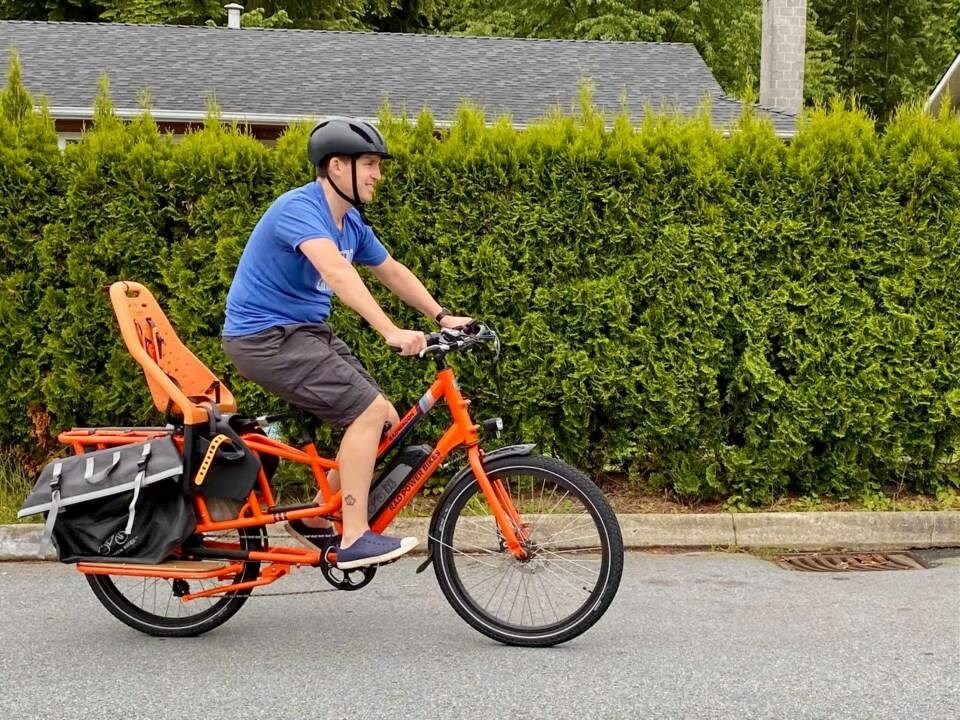There are only so many groceries you can stuff in your backpack or saddle bags – one of the many challenges for errand-running cyclists. But cargo e-bikes are designed specifically to replace the need for a vehicle in this and many other daily scenarios.
At a meeting on Monday (June 5), District of North Vancouver council voted to fund a new lending program for electronically powered bicycles with additional carrying capacity. When operational, the scheme will allow residents with a library card to borrow one for a week, to see how a cargo e-bike could fit into their lifestyle.
All councillors voted in favour of the initiative, which will be funded with $50,000 from the district’s transportation and mobility reserve. Mayor Mike Little was the only dissenting vote, arguing that the municipality shouldn’t take liability for the program, and that $50,000 is a “tremendous” amount for a 12-month pilot.
In order to manage liability concerns raised in previous discussions, staff recommended that lending be handled by a third party, rather than by the public library system as originally proposed.
According to staff, the program is set to be operational April to September 2024 and 2025. Part of the approved plan mentions collaborating with the City of North Vancouver, but such a initiative has not yet been approved there.
While he’s pleased that the program will go ahead, Coun. Jordan Back said he’s disappointed it won’t be ready this year.
“Ideally, I wanted to get it up and running through the summer,” he said. “Obviously, there’s some issues that we have to work out and staff have determined that having a third-party company run it makes more sense.”
When Back proposed the two-year pilot in April, he suggested it be run by the library to keep barriers to accessing the bikes as low as possible. But having a third-party run it isn’t a problem, so long as the accessibility remains high, he said.
It hasn’t been decided which third-party will facilitate the program.
“Lime bike, who is our current e-bike share partner, doesn’t have cargo bikes, but that might be an area that they want to expand into – I had heard that at one point,” Back said, adding that it could also be a bike shop on the North Shore.
Cargo e-bikes eliminate parking and petroleum woes
Back has been riding his own cargo e-bike for four years.
"I can use it for commuting, which I do about half the time,” he said. “I use it a lot just for day-to-day stuff: picking up kids from daycare, doing a grocery run. Basically anything that’s on the North Shore, I will take my e-bike. I don’t even think about getting in the car.”
Back owns a RadWagon, a longtail style e-bike with a 350-pound payload capacity and 72-kilometre range on a single charge. It retails for around $2,600. When the lending program rolls out, residents will be able to borrow this style as well as front-loader and trike configurations.
Advantages of using an e-bike over a car include not having to deal with parking or filling up with gas. Compared to an “acoustic” bike, as Back puts it, hills are a breeze.
“I’ve become an e-bike evangelist,” he said. “E-bikes can appeal to such a broad demographic…. What I love about them is that they’re not just for people that are serious cyclists, there are seniors who may not have ridden a bike in 20 or 30 years.
“Personally speaking, my dad just got one when he turned 70, and he’s been riding it a ton,” he added.
At District of North Vancouver council, conversations around traffic congestion and parking issues come up at nearly every meeting.
“So if we can get more people on bikes, we’re going to get more people out of cars,” Back said.
The provincial government introduced an e-bike rebate of up to $1,400 on June 1, which has moved to a waiting list after filling up 9,000 available spots in less than a day.




